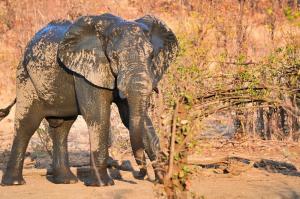
Hundreds of Elephant Families to Be Killed - Animal Groups Worldwide Ask for Help

Baby elephants will not be saved from the killing. ID 186526035 |
International League Cries for a Halt to Killing
"The very idea that these elephants should be killed and eaten fills me with sorrow,” said Harmony Fund Founder Laura Simpson who represents a network of 77 animal rescue squads across 5 continents. “Our league of rescuers across the planet is unified in this plea to stop the killing."
In 2024, approximately 200 elephants were culled, although this received limited media attention. The 2025 culling plan has drawn increased scrutiny, particularly from wildlife advocates who question its scale and rationale. Among those supporting the cull is landowner Willy Pabst, who manages more than 200,000 acres, including the Sango Reserve. Pabst cites overpopulation and environmental degradation as key motivations.
“Elephants play a critical role in maintaining biodiversity," Simpson said. "Their behavior helps regenerate landscapes and supports a wide range of species.”
Animal welfare proponents have also raised questions about the broader motivations behind culling. While officials have stated that the resulting meat benefits food-insecure communities, some local observers note that meat consumption in many rural areas remains infrequent and that additional international food aid could serve as an alternative. Concerns have also been expressed about the commercial value of ivory, hides, and other elephant parts, with critics arguing that the primary financial beneficiaries are private landowners.
Simpson and others are calling for an independent audit of Zimbabwe’s national ivory stockpile to ensure accountability and transparency, especially in the context of ongoing culling activities.
Historically, large-scale elephant culling has been controversial. In South Africa, over 16,000 elephants were culled between 1967 and 1994, a practice that was eventually halted amid questions about its effectiveness and its impact on elephant behavior and herd dynamics.
Researchers such as Dr. Joyce Poole and Cynthia Moss, with decades of experience studying elephant social structures, note that elephants demonstrate signs of trauma and distress in response to culling, which may affect herd cohesion and behavior over time.
Some landowners have raised concerns about damage caused by elephants to vegetation, including baobabs and mopane trees. Conservation experts point to non-lethal mitigation strategies such as protective fencing and note that mopane woodlands are capable of natural regeneration through a process called coppicing.
As an alternative to culling, conservation groups propose elephant translocation programs. Countries such as Congo and Mozambique have expressed interest in receiving elephants to help replenish populations affected by poaching. Modern relocation techniques allow for the movement of small family groups and may offer a solution that supports conservation goals across multiple regions.
International organizations, researchers, and advocates are encouraging collaborative efforts to evaluate and implement evidence-based conservation practices in Zimbabwe. Calls have also been made for global figures, including Dr. Jane Goodall, to lend support to efforts aimed at finding sustainable and humane solutions to elephant population management.
Harmony Fund continues to advocate for greater oversight and public engagement in wildlife conservation policies and is seeking support for its ongoing protection initiatives.
Laura L Simpson
Harmony Fund
email us here
Visit us on social media:
Instagram
Facebook
Other
Distribution channels: Agriculture, Farming & Forestry Industry, Environment, International Organizations, Travel & Tourism Industry, World & Regional
Legal Disclaimer:
EIN Presswire provides this news content "as is" without warranty of any kind. We do not accept any responsibility or liability for the accuracy, content, images, videos, licenses, completeness, legality, or reliability of the information contained in this article. If you have any complaints or copyright issues related to this article, kindly contact the author above.
Submit your press release

